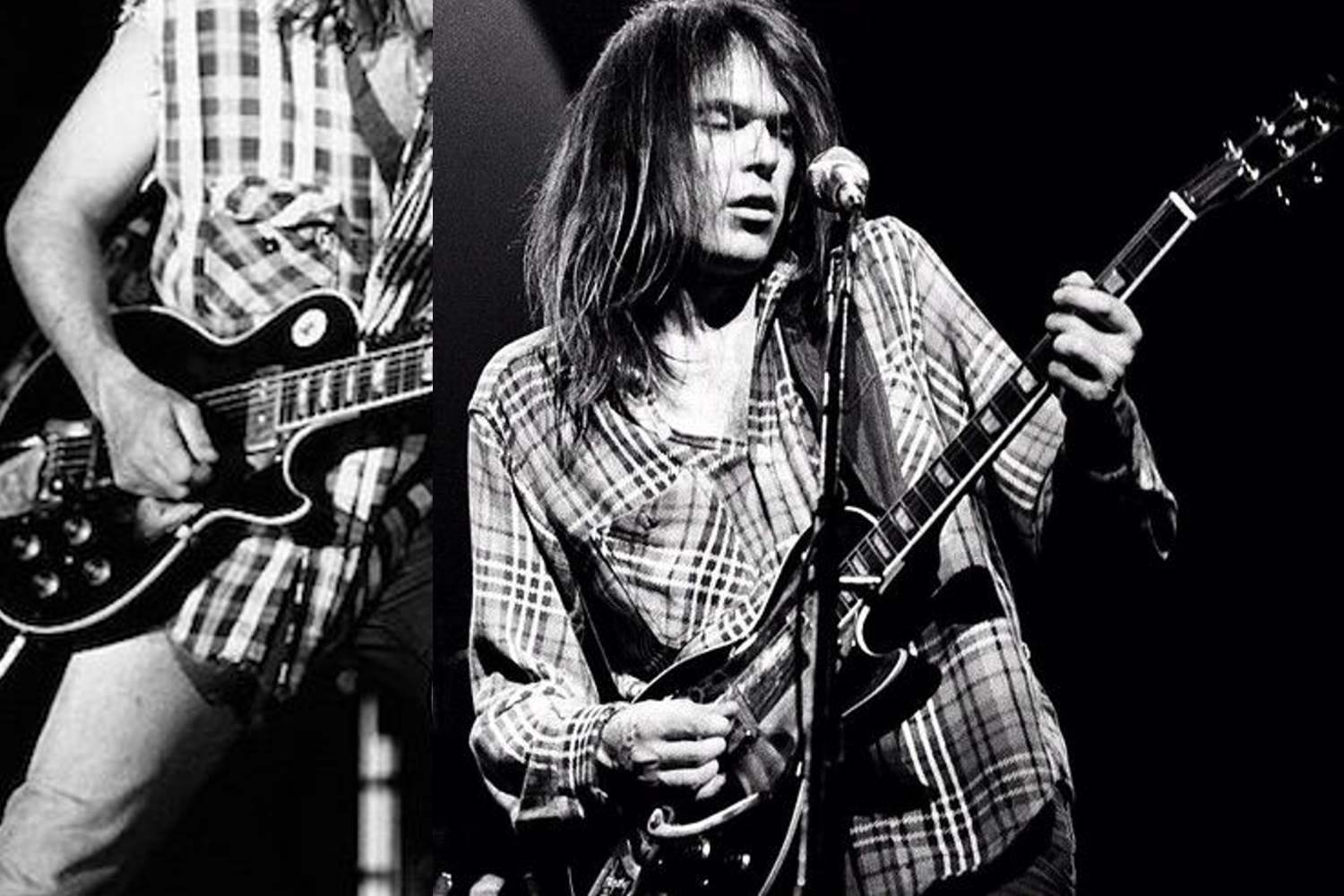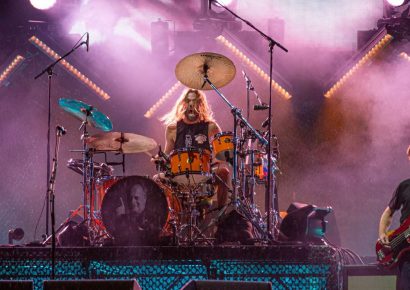From Neil Young to Frank Zappa - the greatest Gibson Les Paul players to ever wield the company's original solid body.
Gibson Les Paul players go back a while now, and it all started 70 years ago.
As bands literally got bigger during the swing era and more amplification was required, Adolph Rickenbacker produced the first electric guitar in 1937. The first electric guitars had hollow bodies, much like an acoustic guitar, until Leo Fender made the Broadcaster in 1950, the first solid body guitar.
Producing a ‘thicker’ sound and greater sustain than their hollow body counterparts, solid body guitars were soon selling like hotcakes. The Gibson guitar company needed a solid body guitar of their own.
After some trial and error, their version made its debut in 1952 at the famous Paramount theatre in New York, played by the man whose name it would bear, and so, the iconic Gibson Les Paul was born.
Here are some of the best Gibson Les Paul players.
Read all the latest features, columns and more here.
Producing a ‘thicker’ sound and greater sustain than their hollow body counterparts, solid body guitars were soon selling like hotcakes. The Gibson guitar company needed a solid body guitar of their own.
After some trial and error, their version made its debut in 1952 at the famous Paramount theatre in New York, played by the man whose name it would bear, and so, the iconic Gibson Les Paul was born.
Famous for rock, country, and blues sounds, in the right hands, the Les Paul can produce all of this and so much more. Here is just a small sample of iconic and ‘should be iconic’ guitarists who have selected the Gibson Les Paul as their musical weapon of choice.
Les Paul
This one goes without saying, right? Not simply a luthier and inventor, Les Paul himself was a fine jazz and country guitarist and an early pioneer of studio effects, including delay, phasing, flanging and multitrack recording. With his wife Mary Ford, they sold millions of records in the 1950’s and Paul’s influence on the sounds a guitar could make, cannot be understated.
Jimmy Page
When James Patrick Page, successful and much sought-after studio musician and also member of the famous Yardbirds, decided to form a new band of unknowns, the Who drummer Keith Moon joked that it will “go down like a lead balloon”.
Page reworked lead balloon into the name Led Zeppelin and so began the career of what is arguably the most influential heavy rock band of all time. While Page of course owns many guitars, it is the Les Paul we know and love him for the most. At home with blues, country, rockabilly, metal, odd time signatures, touches of reggae, funk and even whipping out the odd violin bow, that distinctive Les Paul sound is splashed all over so many unforgettable Zeppelin songs.
Almost every guitarist at some point will try and emulate Page’s distinctive Les Paul riffs on their journey along the fretboard to success, so as far as Gibson Les Paul players go, Page has to be close to number one.
Duane Allman
If a list of ‘greatest guitar players of all time’ doesn’t have Duane Allman near the top, then please stop reading it, no less an iconic Gibson Les Paul players list. Few have reached his masterful skill level in a lifetime, let alone in the short years he had on earth.
When the Allman Brothers Band released their self-titled debut album in 1969, they set the benchmark for the entire southern rock genre. Guitar playing is not just about how many notes you can play and how fast you can play them, it is about taste and tone and Allman’s playing, with his 1957 Les Paul Gold top, can equally bring a tear as much as set your soul free to fly.
Also, highly influential as a session player with Derek and the Dominoes, Aretha Franklin, and Boz Scaggs, just to name a few, we can only imagine how much further his talent would have grown if not for his untimely passing in a motorbike accident at just 24 years of age.
Neil Young
For over 50 years, we have all been lucky enough to enjoy the talents of what might be Canada’s finest export, and one of the finer Gibson Les Paul players around.. Loaded with awards, gold and platinum albums and labelled the ‘Godfather of Grunge’, Neil Young’s influence on acoustic and electric music is undeniable.
In 1968, Young acquired a 1953 Les Paul Gold top that he nicknamed ‘Old Black’, and that guitar has remained in use right up until the present day. Enjoy Neil’s sounds with Crazy Horse or perhaps you prefer his other moods such on ‘After the Gold Rush, ‘Harvest Moon’ or ‘Mirror Ball’?
Whatever way you listen to Young’s music, then you have enjoyed that iconic ‘Old Black’ Les Paul sound.
Joey Santiago
It’s 1986 in Boston and university roommates Charles Thompson and Joseph Santiago are messing about on guitars and thinking of forming a band. Charles will play guitar and sing; Joey will play bass. Then Joey decides he really wants to play lead guitar.
So, they advertise for a bass player, Kim Deal answers and brings a friend named Dave Lovering along to play drums. The indie powerhouse group Pixies are born. Thankfully for all of us, Joey chose guitar over bass and would go on to create so many superb guitar melodies and distinctive hooks.
Surf guitar, grunge, metal, angry feedback, and sweet pop jangle all make up Santiago’s sound and he is never far away from is his trusty Gibson Les Paul when making them.
Mick Ronson
After Space Oddity topped the charts in 1969, Bowie was already a star but his association with guitarist Mick Ronson and the Spiders from Mars band would propel him into superstardom forever.
A classically trained pianist and cello player, Ronson heard the irresistible twang of instrumentalist Duane Eddy and soon switched to guitar. Astride a Les Paul and often dressed in Bowie’s iconic stage costumes, Ronson’s Les Paul veers from the perfectly twisted pop of ‘Life On Mars’ to the guitar hero antics of Ziggy Stardust and the glam rock party pulse of ‘Jean Genie’.
A superbly talented guitarist across many genres, Mick Ronson showed a Les Paul, like Bowie himself, can have many voices.
Frank Zappa
“I like the tone quality and sustain that I can get out of the Les Paul, which is due to the bulk of the guitar,” said fretboard virtuoso Frank Zappa, which is about as fine as an endorsement that any guitar brand could wish for.
Zappa released 62 albums in his lifetime across multiple genres and styles from doo-wop, to country, to blues, to prog, to orchestral, and beyond. Check out his blistering Les Paul solos on the Shut Up and Play Yer Guitar compilation albums.
The word genius gets thrown about a lot, in Zappa’s case, its use is warranted.
Paul Kossoff
A classically trained guitarist as a youngster, Kossoff saw The Bluesbreakers in his hometown of London as a 15-year-old and rushed to the shops to get himself a Les Paul soon after.
Criminally underrated in just about every ‘greatest guitarists of all time’ list, Kossoff’s work with Free remains inspirational to those in the know. At home with shimmering melodies as much as blistering solos and heavy hitting riffs, every rock guitar player should spend some time soaking in the sounds of Kossoff and his Les Paul legacy.
Billy Gibbons
Already an accomplished guitarist with the Moving Sidewalks in the late 60’s, Gibbons switched from Fender guitars to a Les Paul when he and bandmates Dusty Hill and Frank Beard formed the mightiest of mighty trios in 1971, ZZ Top.
Rooted in the blues and southern rock, Gibbons’ playing is seemingly simple and yet highly skilled all at the same time. His rich tones and no-nonsense fretwork have delighted live audiences and music fans for over 50 years.
Randy Rhoads
Rhoads’ mother was a professional pianist and passed on knowledge of music to her son from an early age. Not happy with the direction of his first well known band Quiet Riot, legend has it that when he was asked to audition for ex-Black Sabbath icon Ozzy Osborne’s new solo project band in 1979, he was just beginning to warm up on his Les Paul when Ozzy shouted: “You’re hired!”
They made just two albums together before the 25-year-old Rhoads was killed in a botched airplane attempted prank. Those albums Blizzard of Oz (1980) and Diary of a Madman (1981) contained some of the most influential guitar playing heavy metal has ever produced, thanks to the mind and magic of Rhoads and his Alpine White Gibson Les Paul Custom.
Ace Frehley
Bronx native Paul Frehley is a very fine guitar player and while he may not appear on every ‘best of all time’ lists, one cannot deny that his work with Kiss in the 70’s remains massively influential to countless legions of aspiring rock players.
As ‘Ace the Spaceman’, he used his unschooled, often unorthodox technique to blast out multiple killer riffs on songs that have helped us all to shout it out loud while we rock and roll all nite and party every day.
Freddie King
Blues aficionados often speak of the ‘Three Kings of the blues’, (BB King and Albert King being the two others). Freddie King is the least well known but just as talented.
Beginning guitar at the age of just six in Texas, his family moved to Chicago in his teen years and he began to play live as often as he could. His breakthrough instrumental hit ‘Hideaway’ in 1960 has become a blues standard and named by the Rock and Roll Hall of Fame as one of the songs that shaped rock.
His later guitar work on the ’70s albums Texas Cannonball and Burglar are also a highwater mark for one of the true kings of the blues.
Slash
You may not know his real name is Saul Hudson. You may also not know that he was not born in the USA, but in England.
It’s a safe bet that you do know Saul, or Slash, as the lead guitarist for the Los Angeles heavy rock pop powerhouse that is Guns N’ Roses. He’s worked with Michael Jackson, Lenny Kravitz, Velvet Revolver, Myles Kennedy & The Conspirators, and his own Slash’s Snakepit – but his work with Guns N’ Roses, particularly on 1987’s Appetite for Destruction, perhaps remains the high watermark for this supremely talented player.
Describing the Gibson Les Paul as “the best all round guitar for me” Slash is a true modern day guitar hero of the finest order.
For more iconic guitars and guitarists, check out our list of the most iconic Fender Telecaster players of all time.

